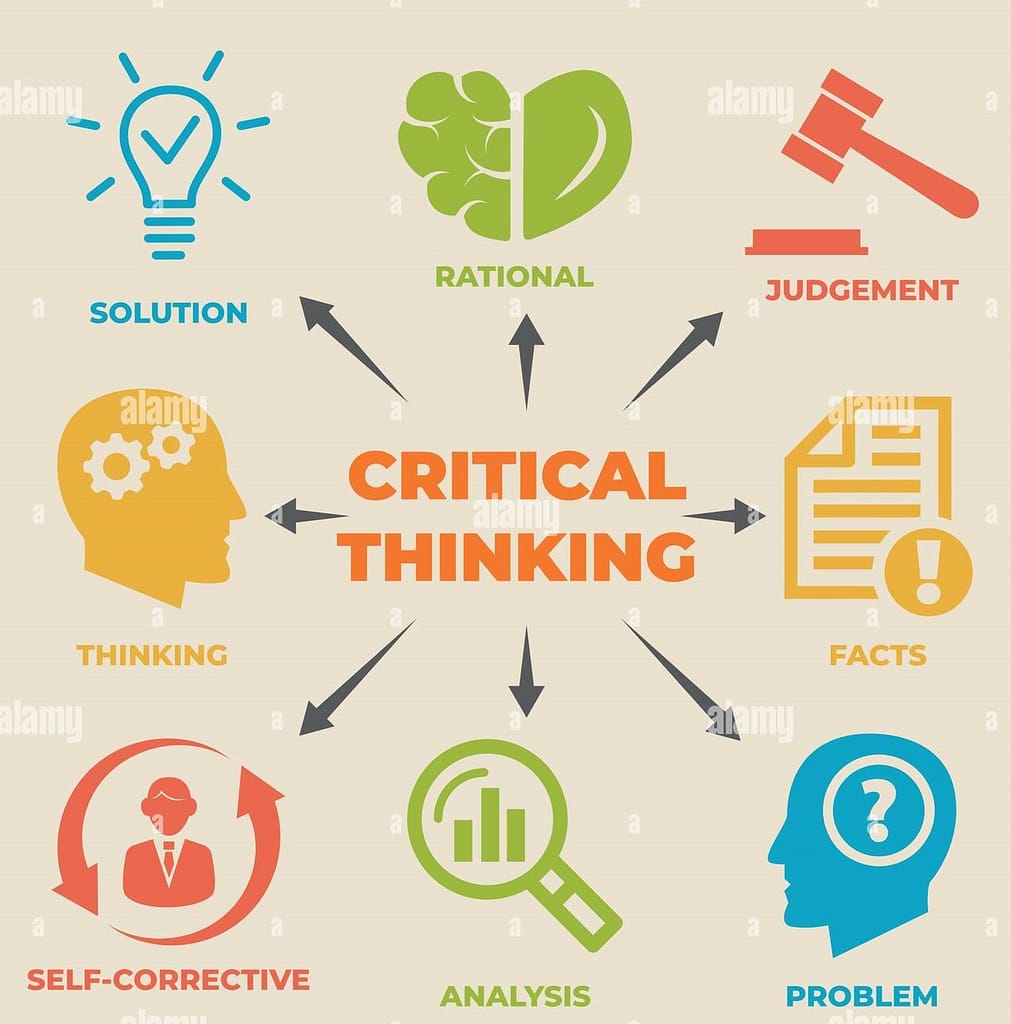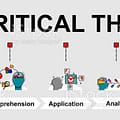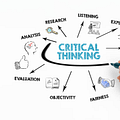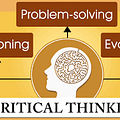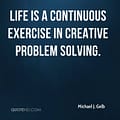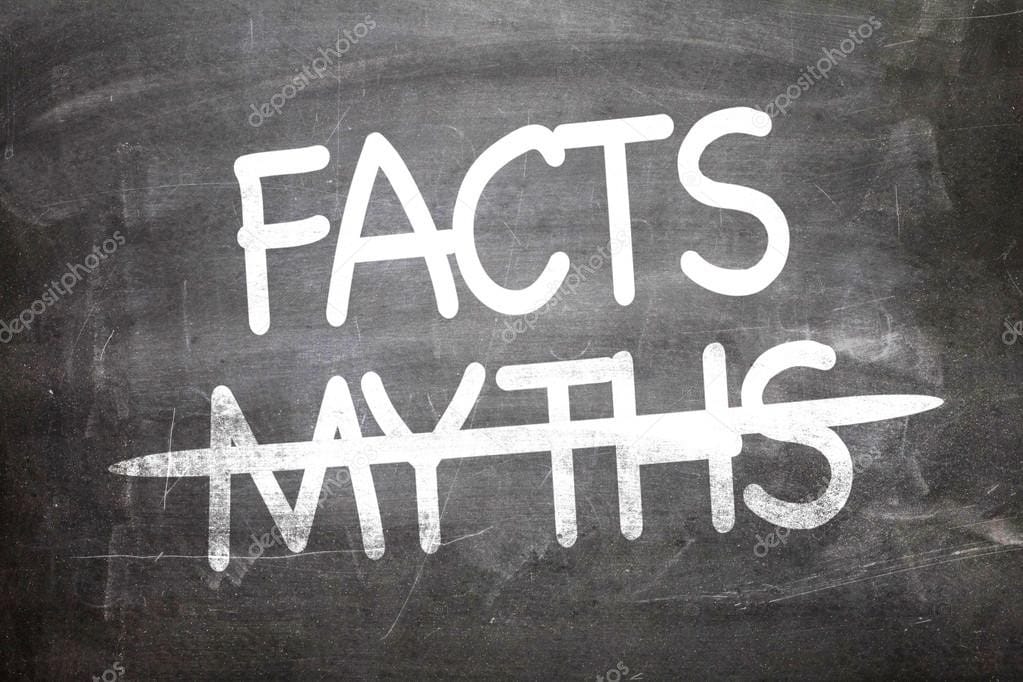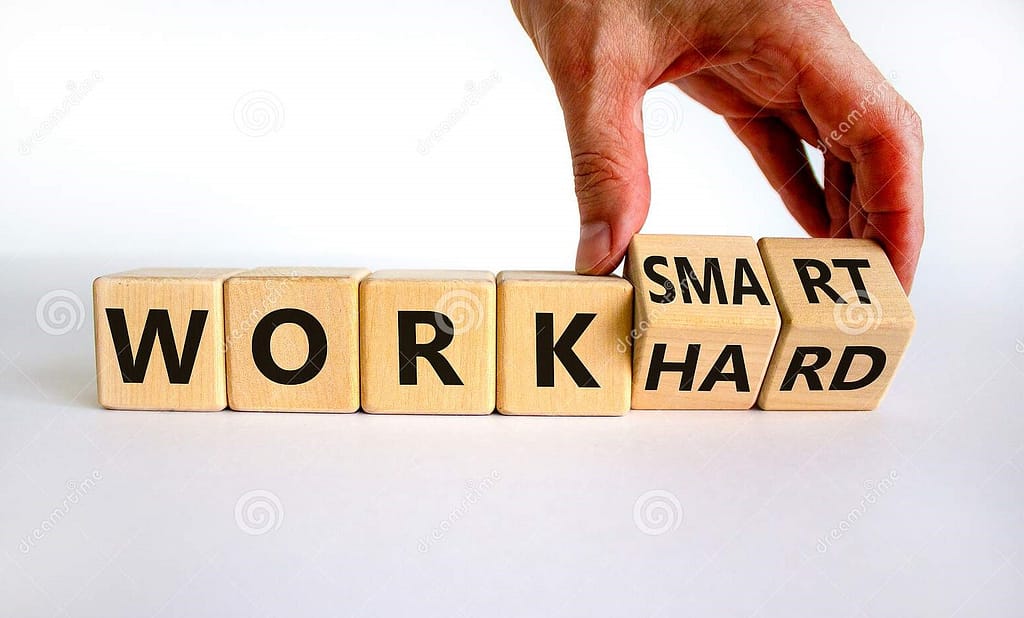Leaders at any level in the organisation have to make several decisions every day.
Knowingly or unknowingly all of us use critical thinking to weigh the pros and cons of our options, prioritise our responsibilities, and evaluate the impact of our actions on the organization’s success internally as well as in the marketplace.
Too many leaders and managers make hasty and unwise decisions, without taking time to evaluate a problem or situation from all sides and put the organisation and its members in difficult situations.
Critical thinking is an objective, rational and systematic way of thinking that helps you to analyse a situation and information from all sides and get the best answers to a question or problem so that you can make wise decisions to get positive outcomes.
It is a highly in-demand skill in the job market.
It helps you to take cognizance of a situation or problem from every angle by using multiple sources of information, checking the validity of the facts and evidence, filtering out all misinformation, evaluate all the options and outcomes to arrive at the best possible solution.
Therefore it is important to master critical thinking so that you can form better arguments, assess the situation, and make sound decisions objectively.
Though none of us are good at it, the good news is that it can be learned.
In this post, I have enumerated 16 such habits that will help you become a masterful critical thinker, be a more valuable leader, an effective employee, and experience more success and respect in your career.
Do you want to become a Brilliant Critical thinker ? Get the 58 Brilliant Critical thinking questions HERE
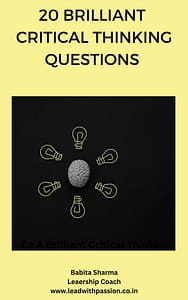
THE IMPORTANCE OF CRITICAL THINKING IN THE WORKPLACE
In the dynamic marketplace, organizations value critical thinkers because they have good problem-solving skills, creativity, innovativeness, sound decision-making abilities, and a good overall performance in general.
Leaders and managers need to act in the best interest of all involved.
Because decision-making is such a complex process that involves, collecting information, analysing it, observing, reasoning, and evaluating all your options, it is therefore imperative to actively question each step of your thinking process to make wise decisions.
Critical thinking helps you form your ideas, take the opinions of team members and reason over them, and reach better solutions.
Critical thinking is an important and indispensable skill in the workplace because it is an important skill to achieve the organisation’s business goal and move your career forward too.
Here are 6 reasons why critical thinking is important in the workplace and must be cultivated by all leaders and managers.
-
Helps in making well-informed solutions.
-
Better decision-making by evaluating the validity of an argument and its future impact.
-
Better comprehension ability in communication – while conversing over the phone or meeting or one-to-one, or interpreting written communication like emails, messages, or any other form of written communication.
-
Better engagement with team members and co-workers at every level-intellectual, emotional, work, and better relationships among employees and more cohesiveness in the organization.
-
Increases Self-improvement by evaluating your work and increases your effectiveness and efficiency.
-
Helps in Independent and objective thinking, and develops strong ethics and confidence.
1. RAISE YOUR SELF AWARENESS
Our decisions are influenced by our beliefs and values. It is human nature to be drawn toward information that supports our point of view. This is a barrier to critical thinking.
Self-reflection helps you to become more aware of why and how you process information in a certain way and how this impacts your judgment and decisions.
You become more aware of your biases and you can work towards overcoming them.
Self-reflection helps you to dive deep into yourself and consider your thought process, beliefs, values, morals, and ethics and think objectively about your strengths, weaknesses, likes, dislikes, preferences, and biases.
It connects you with your inner self. You know what you believe in and how you reflect these thoughts, beliefs, and values in every aspect of your life each day -eg profession, personal, family, social life, etc.
By knowing yourself, you can gain a better understanding of yourself as to why you approach specific situations from a certain perspective.
So make self reflection a habit .
2.CHALLENGE YOUR THOUGHT AND ASSUMPTIONS
To become more efficient in the workplace it is important to understand how you receive and process information.
At a personal level, it is crucial to understand how to listen, interpret and react to information.
Critical thinking helps you to recognize your biases, understand how they prevent you from deriving solutions and taking good decisions, and help you act more objectively.
Identifying and challenging these biases helps you to break new ground by arriving at more creative solutions and take better decisions.
Make it a habit to Question your assumptions and beliefs. Look for evidence that contradicts your assumptions. Consider alternative points of view and arguments. This will help you learn something new.
Questioning is helpful when the risk is high. For example -when discussing the long-term strategy of the company. This involves discussing the effort, and expenses, increasing the business in the years to come, tapping markets and adapting to changing market trends in the future, productivity in meeting market demands, and the change in suppliers and clients.
3.GATHERING INFORMATION
Gathering information is important habit for making well-informed decisions.
The information must be collected in the form of data, facts, and opinions.
You must also research to dig deeper and dive down the rabbit hole.
This will help you understand better and solve the problem more effectively.
Next check the authority and authenticity of your sources.
Nothing must be taken at face value.
It is therefore important to consider the gaps -look for different opinions, motives and biases. Challenge your assumptions and beliefs.
Look for evidence that supports your or others’ beliefs and arguments. Evaluate every perspective on the problem, and assess the strengths and weaknesses of the arguments.
Note -If any information appears to be irrelevant or invalid, don’t include it in your decision-making. But don’t omit information just because you disagree with it, or your final decision will be flawed and biased.
This will help you make well-informed decisions.
Here are some questions to help you at this check the validity of your information.
-
Is the source of your information trustworthy? ( they may be the authors, colleagues or peers, industry publications, websites, blogs, etc.)
-
Is the information you have gathered relevant to the present situation?
-
Has the information received any direct criticism?
-
Does the information have any fallacies or inaccuracies?
-
Is there any evidence to endorse the information you have gathered?
-
Is the information you have gathered objective and authentic in every way? (Is it a fact or just someone’s opinion? Is there any vested interest or motive behind the information? -like promoting a particular service or organization.)
4. ANALYSE
While analyzing it is important to apply reasoning to make sensible predictions and make educated decisions.
So the things you need to do develop this habit are –
-
Interpret the information. Know the key findings and note the important takeaways. Connect the dots and look for what it points to.
-
Identify patterns and similarities. Observing the trend will help you to make sensible decisions.
-
Challenge the information by building arguments on your findings and examining the arguments critically. Weigh all the pros and cons.
-
Now make well-informed decisions.
-
Last of all take some time to reflect on what you have learned, and what is posing as a challenge. Have a look at the bigger picture and note what you have learned from your observation and experience.
5. EVALUATE THE EXISTING EVIDENCE
Apart from researching and sorting the facts, it is crucial to evaluate the existing evidence to make well-informed decisions and formulate more effective solutions in the present.
Make it a habit to evaluate the existing evidence by asking questions like –
Have I encountered a similar project or challenge before?
What did I learn from that experience?
6. REASON LOGICALLY
It is important to be cautious while taking decisions. Being emotional can lead you to take hasty and unwise decisions.
Therefore using logical reasoning skills helps come up with plausible options and outcomes for making sound decisions.
When you are making decisions in the organization with your team or your seniors, it is important to know when a conclusion is a fact and when it is not.
The two most common thinking fallacies while reaching conclusions are ‘’Could be True’’ and ’’Post Hoc ‘’ thinking.
Being aware of such thinking fallacies helps you think more logically.
‘’Could be true’’ conclusions are based on assumptions.
In the ”Post Hoc ‘’thinking, people believe that ‘’because event Y happened after event X, therefore event Y must have been caused by event X.’’
So while deciding with team members or peers, make it a habit to be mindful of all the logic given by the people involved. Challenge all assumptions and beliefs and see how valid they are.
Some questions to help you with this are –
‘’ Is the argument supported at every point by evidence ?’’
‘’ Do all the pieces of evidence build on each other to produce a sound conclusion ?”
.
7. ASK QUESTIONS
Questions are a great way to learn in-depth about a topic and learn new ways of thinking about things.
They are a catalyst for intelligent discussion with teams in the organization. They encourage the exchange of ideas from everyone on the team.
They help you in gaining clarity and become more certain in the face of uncertainty.
Things that might have been overlooked, miscommunicated, or misunderstood, can be brought to the forefront and resolved by asking questions.
Repeat or rephrase the responses to understand information accurately.
Ask follow-up questions to know the details that might have been left out or misinterpreted.
For personal growth and goals, asking questions to yourself is a great habit that can help you in expanding your knowledge and supporting your goal.
8. SEEK OUT DIVERSITY OF THOUGHT AND COLLABORATION/SEEK OPINION OF OTHERS
The organization’s success and wins in business depend on smart thinking.
In the organization, there are people from diverse backgrounds -age, religion, political preference, cultural, financial, and educational.
Such a vast diversity is very helpful in holding constructive debates and making well-informed decisions.
It is because people from different backgrounds bring their unique perspectives, understanding, and experiences to the table. It brings better team engagement.
This widens your take on the problem and helps you arrive at a more objective solution by helping you think more critically.
It prevents you from becoming more rigid and polarised in your thinking. You are more likely to gain richer insights and change your beliefs based on new information.
So make it a habit to collaborate with others and seek their opinion .
9. PRACTISE ACTIVE LISTENING
Listening carefully and actively to your team and direct reports or colleagues can open your eyes to new ideas and perspectives.
Active listening involves empathy and understanding things from others’ perspectives.
This helps you to pay close attention to details, understand the context and consider things from different perspectives.
This is a very important habit for workplace productivity as you can understand what they need and respond positively.
10. LEARN FROM EXPERIENCE
Make it a habit to learn from your past by reflecting.
When you reflect, you are in a better position to foresee what may happen in the future.
You gain a level of foresight.
Foresight will enable you to see how others might feel about a situation or decision you make. The positive and negative impact it will create and the reactions it will produce.
This will help you make more healthy choices for better outcomes in the future.
11. INVERTING
Inverting the problem means working on a problem backward.
This is a very powerful and helpful strategy that can help you see things you might otherwise overlook.
In this approach, you explore a failure from the end to the beginning, rather than beginning to end.
This strategy helps you identify, plan and address the true impact at each stage in the sequence.
Read more on Inversion HERE.
12. EVALUATE YOUR WORK .
Make it a habit to evaluate your work and the strength of your arguments. This will help you see the scope of improvements and minimize failure.
13.PRACTISE HYPOTHETICAL DILEMMAS
Practising hypothetical dilemmas, are good mental exercises to stimulate critical thinking. They help you make better choices.
This kind of practice helps you develop foresight and encourages out-of-the-box thinking to solve problems more effectively.
One example of a Hypothetical Dilemma is -’’ You have two children, both have the same life-threatening condition, but you only have enough medicine to cure one of them. And you have to choose which one survives and which one dies.’’
So occasionally make it a habit to practice hypothetical dilemmas.
15.READ NEW CONTENT FROM NEW CONTENT CREATORS
One more helpful habit to encourage critical thinking is to read from new content creators.
Look out for new content from New authors, speakers, or thinkers. You will learn new facts and ideas which you can integrate into your critical thinking.
16.SURROUND YOURSELF WITH CRITICAL THINKERS
Seeking the company of critical thinkers will help you create a supportive environment where thoughts, opinions, and ideas will be shared freely.
By making it a habit ,you will have a bank of knowledge and access to much better ideas.
CONCLUSION
To become a strong leader and make progress in your career, developing critical thinking is critical.
It is a useful skill in the workplace to guide your decisions and actions.
In this age of information, critical thinking skills help you take an objective view of the world and make well-informed decisions.
It is a highly effective tool that helps in filtering out your biases and helps you see things from different perspectives.
Just like motivation needs to be refuelled constantly, you need to exercise your critical thinking muscles so that it becomes stronger over time.
I hope you have found the habits enumerated above to strengthen your critical thinking skills helpful.
Which habit has appealed to you the most? Which one will you implement now? Please share your thoughts below.
Babita Sharma
Leadership Coach
www.leadwithpassion.co.in

